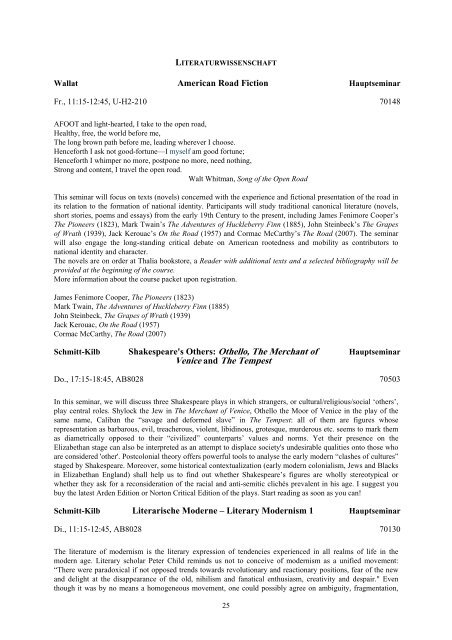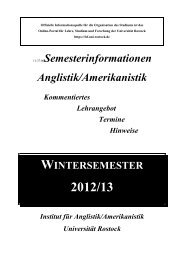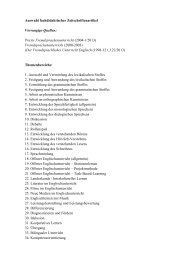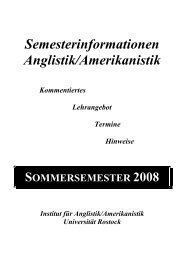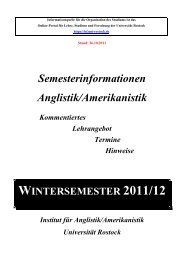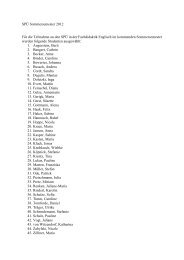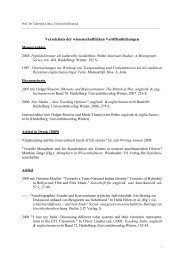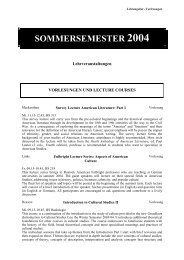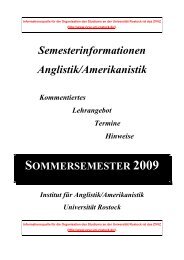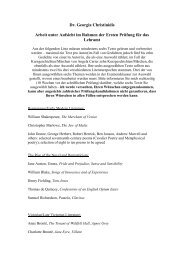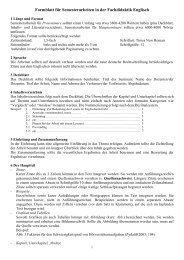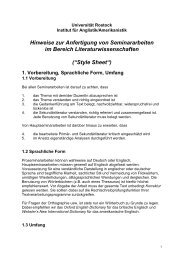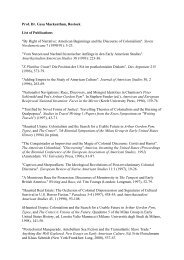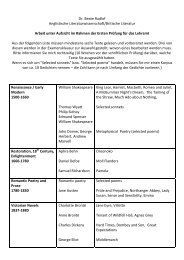Semesterinformationen Anglistik/Amerikanistik - Institut für Anglistik ...
Semesterinformationen Anglistik/Amerikanistik - Institut für Anglistik ...
Semesterinformationen Anglistik/Amerikanistik - Institut für Anglistik ...
You also want an ePaper? Increase the reach of your titles
YUMPU automatically turns print PDFs into web optimized ePapers that Google loves.
LITERATURWISSENSCHAFT<br />
Wallat American Road Fiction Hauptseminar<br />
Fr., 11:15-12:45, U-H2-210 70148<br />
AFOOT and light-hearted, I take to the open road,<br />
Healthy, free, the world before me,<br />
The long brown path before me, leading wherever I choose.<br />
Henceforth I ask not good-fortune—I myself am good fortune;<br />
Henceforth I whimper no more, postpone no more, need nothing,<br />
Strong and content, I travel the open road.<br />
Walt Whitman, Song of the Open Road<br />
This seminar will focus on texts (novels) concerned with the experience and fictional presentation of the road in<br />
its relation to the formation of national identity. Participants will study traditional canonical literature (novels,<br />
short stories, poems and essays) from the early 19th Century to the present, including James Fenimore Cooper’s<br />
The Pioneers (1823), Mark Twain’s The Adventures of Huckleberry Finn (1885), John Steinbeck’s The Grapes<br />
of Wrath (1939), Jack Kerouac’s On the Road (1957) and Cormac McCarthy’s The Road (2007). The seminar<br />
will also engage the long-standing critical debate on American rootedness and mobility as contributors to<br />
national identity and character.<br />
The novels are on order at Thalia bookstore, a Reader with additional texts and a selected bibliography will be<br />
provided at the beginning of the course.<br />
More information about the course packet upon registration.<br />
James Fenimore Cooper, The Pioneers (1823)<br />
Mark Twain, The Adventures of Huckleberry Finn (1885)<br />
John Steinbeck, The Grapes of Wrath (1939)<br />
Jack Kerouac, On the Road (1957)<br />
Cormac McCarthy, The Road (2007)<br />
Schmitt-Kilb<br />
Shakespeare's Others: Othello, The Merchant of<br />
Venice and The Tempest<br />
Hauptseminar<br />
Do., 17:15-18:45, AB8028 70503<br />
In this seminar, we will discuss three Shakespeare plays in which strangers, or cultural/religious/social ‘others’,<br />
play central roles. Shylock the Jew in The Merchant of Venice, Othello the Moor of Venice in the play of the<br />
same name, Caliban the “savage and deformed slave” in The Tempest: all of them are figures whose<br />
representation as barbarous, evil, treacherous, violent, libidinous, grotesque, murderous etc. seems to mark them<br />
as diametrically opposed to their “civilized” counterparts’ values and norms. Yet their presence on the<br />
Elizabethan stage can also be interpreted as an attempt to displace society's undesirable qualities onto those who<br />
are considered 'other'. Postcolonial theory offers powerful tools to analyse the early modern “clashes of cultures”<br />
staged by Shakespeare. Moreover, some historical contextualization (early modern colonialism, Jews and Blacks<br />
in Elizabethan England) shall help us to find out whether Shakespeare’s figures are wholly stereotypical or<br />
whether they ask for a reconsideration of the racial and anti-semitic clichés prevalent in his age. I suggest you<br />
buy the latest Arden Edition or Norton Critical Edition of the plays. Start reading as soon as you can!<br />
Schmitt-Kilb Literarische Moderne – Literary Modernism 1 Hauptseminar<br />
Di., 11:15-12:45, AB8028 70130<br />
The literature of modernism is the literary expression of tendencies experienced in all realms of life in the<br />
modern age. Literary scholar Peter Child reminds us not to conceive of modernism as a unified movement:<br />
“There were paradoxical if not opposed trends towards revolutionary and reactionary positions, fear of the new<br />
and delight at the disappearance of the old, nihilism and fanatical enthusiasm, creativity and despair." Even<br />
though it was by no means a homogeneous movement, one could possibly agree on ambiguity, fragmentation,<br />
25


